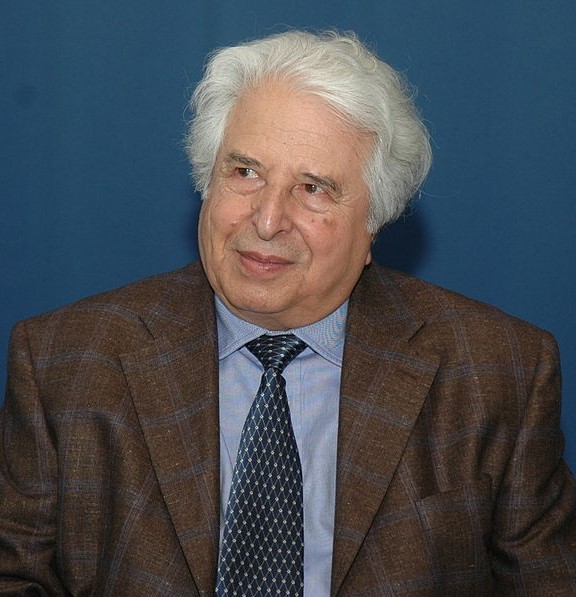Networking science.
Saul Friedländer

Balzan Prizewinner 2021 for
Holocaust and Genocide Studies
He is one of the most important researchers of the Holocaust and genocide – and a warning voice of the present: the multiple-award-winning Israeli historian and author Saul Friedländer.
This also has to do with his biography. Friedländer was born as Paul in 1932 as the child of a German-speaking Jewish family in Prague. After the occupation of Czechoslovakia, the family emigrated to France, where Paul Friedländer survived in a Catholic boarding school. His parents were turned back at the Swiss border during an attempted escape, deported and presumably murdered in Auschwitz. Friedländer emigrated to Israel in 1948, where he changed his name to Saul. After studying and gaining his doctorate in Paris and Geneva, he taught in Israel and the USA, where he also lives today.
As a historian, he not only sheds light on political developments, but also focuses on the victims of the Holocaust and their voices. His book «The Years of Extermination: Nazi Germany and the Jews, 1939-1945» is considered to be a standard work on the subject and was awarded the Pulitzer Prize. He is receiving the Balzan Prize for «his unparalleled impact on the development of Holocaust Studies, for his masterpiece, an integrated history of the persecution and extermination of European Jews. For creating a historical narrative that expresses the unspeakable, intertwining scholarly analysis with the disruptive voices of the victims, perpetrators and bystanders.»
What award-winning researchers pass on to young, upcoming researchers
Interview by Astrid Tomczak-Plewka with Christina Morina
Christina Morina, Balzan Prizewinner Saul Friedländer has decided to use half of the prize money for a research project under your supervision. What is it about?
We are researching diaries of persecuted Jews and non-Jewish “bystanders” all over Europe. The English term “bystander” refers to people who cannot clearly be classified as perpetrators or victims, but who, as contemporaries, were nevertheless part of the events and also played a certain role in them. In German, they are referred to as “MitläuferInnen” and “ZuschauerInnen”, but these are not meaningful analytical terms. We want to find out how the persecution of the Jews was reflected in the diaries of supposedly uninvolved fellow human beings, how Jewish diarists perceived these “bystanders” and ask what role the non-Jewish mainstream social groups played in the Shoah as a whole.
How would you explain your field of research to 14-year-olds who are currently studying World War II at school?
We deal with the fundamental question of how it can happen that certain groups of people are systematically excluded from a society, discriminated against, insulted and persecuted to the point of physical violence and murder. We ask ourselves what circumstances contribute to making such a thing possible. What is going on in such a society, what drives neighbours, colleagues, acquaintances to behave indifferently or even approvingly towards the persecution of the victims, or even to actively exacerbate it? And conversely, we also want to find out what can contribute to preventing exactly this kind of thing from happening.
What is the significance of the Balzan Prize for you?
It gives us a great opportunity to continue to do research on the basis of Saul Friedländer’s life work, and in particular to continue his work with diaries. For me personally, it’s one of the greatest awards I could ever dream of. It enables me to bring together a team of colleagues and to establish a research focus at Bielefeld University that had not previously existed as such. But the Prize also enables me to continue and combine lines of research that I have been working on for 10 years. So, this prize is a wonderful coincidence, and I am very grateful to the Foundation and Saul Friedländer for their generosity, support and trust.
What advice would you give to young people who want to progress in research – in your field or elsewhere?
I think it’s very important to start out from your own questions and to be clear about what motivates you. Personal interest, motivation and the question of what you would like to achieve within and outside of science are central. Then you should devote yourself to these questions single-mindedly and with all the energy you have. The beauty of science is that it’s a sociable undertaking that thrives on exchange with others. I would advise people to cultivate this exchange and to realize that we, with our work, are always standing on other people’s shoulders.
Swiss Academies of Arts and Sciences
House of Academies
Laupenstrasse 7
P.O. Box
3001 Bern
Switzerland